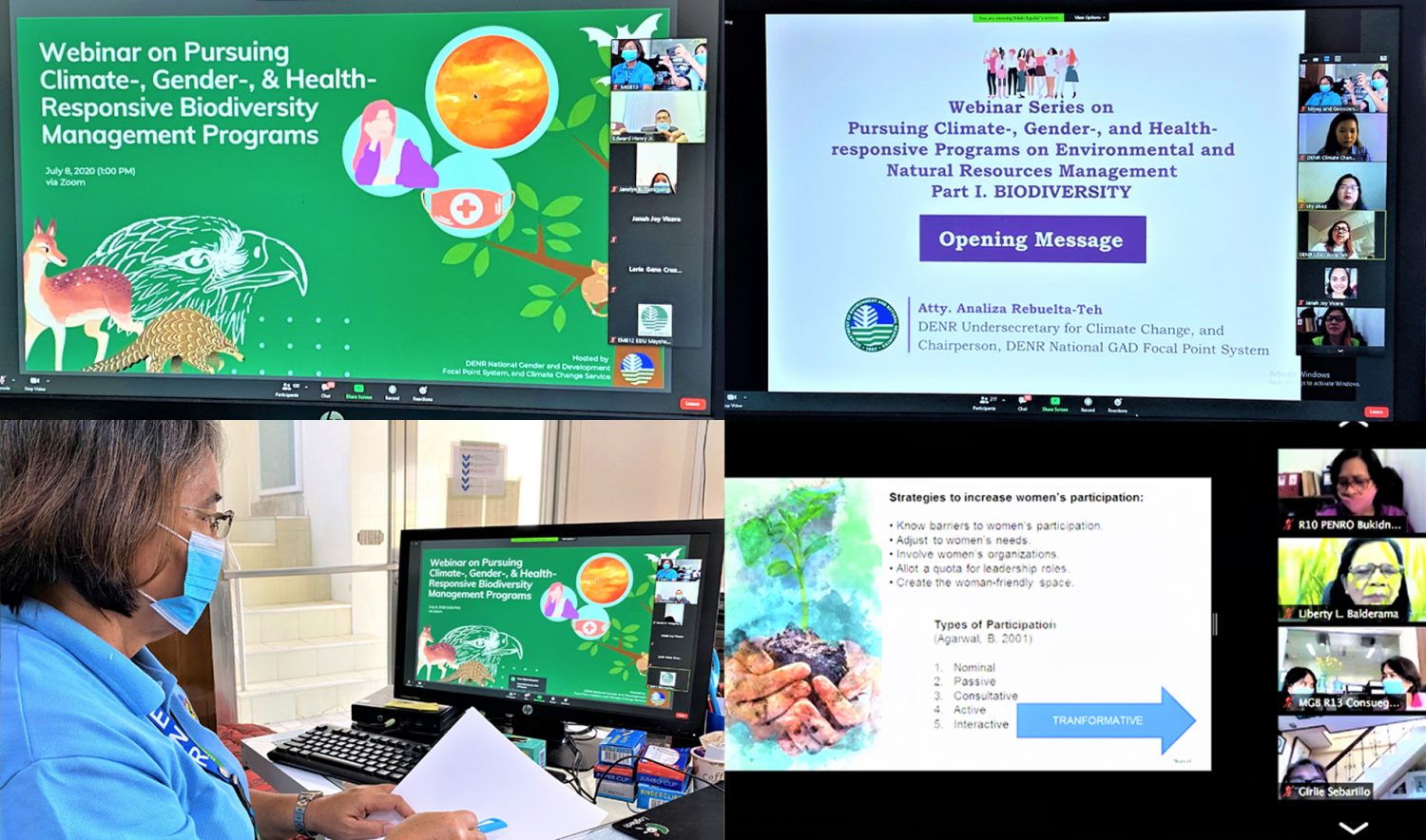
The Gender and Development (GAD) Focal Point System of the Mines and Geosciences Bureau (MGB) Regional Office (RO) No. XIII took part in the Webinar Series on Pursuing Climate-, Gender-, and Health-responsive Programs on Environment and Natural Resources Managementvia Zoom Platform on July 8 to 9, 2020.
The webinar series aimed to increase the participants’ understanding of the links of biodiversity management, climate change, disasters, gender and health and identify possible entry points and recommendations in the pursuit of climate-, gender-, and health-responsive environment and natural resources management programs. Hosted by the Department of Environment and Natural Resources (DENR) National Gender and Development Focal Point System and Climate Change Service, the said activity was attended by the Directors, GAD Focal Persons and Planning Chiefs of the DENR Central Office Services, Bureaus and Attached Agencies and the Regional Executive Directors, GAD Focal Persons, Climate Change Focal Persons, Planning Chiefs, and Regional Public Affairs Officers of DENR Regional Offices. From the Mines and Geosciences Bureau and Environmental Management Bureau Regional Offices, Regional Directors, GAD Focal Persons, Climate Change Focal Persons, Planning Chiefs, and Regional Environmental Education and Information Officers also took part in the said activity.
Atty. Analiza Rebuelta-Teh, DENR Undersecretary for Climate Change and DENR National GAD Focal Point System Chairperson, kick-started the webinar series with a message. Usec. Teh laid emphasis on the need to undertake gender mainstreaming in the environment and natural resources management. She expounded on the critical role of women in the crafting of policies and programs and improvement of local natural resource governance, conservation efforts and more sustainable livelihoods. She also discussed the need to promote gender equality and equity which will intensify participation, benefits and development outcomes. “The essence of gender mainstreaming is strengthening women participation and leadership. Women play important roles for leading actions to strengthen resilience to disaster and climate-related shocks and stresses, especially at the local level. Women have valuable capacities to strengthen the resilience of communities in the changing climate and at times of disaster,” Usec. Teh stated.
Prior to the presentations, Usec. Teh encouraged the participants to challenge existing standards and paradigms and concur with the objectives of the Sustainable Development Goals, the Paris Agreement, and the Sendai Framework for Disaster Risk Reduction. She also encouraged the participants to ask questions and share their experiences in order for them to have a productive webinar.
The first part of the webinar series centered on Biodiversity. Ms. Armida Andres, Planning Chief of Biodiversity Management Bureau walked the participants through Linking Biodiversity, Climate Change, and Disasters: Pursuing Climate-responsive Programs on Biodiversity Management while Ms. Katherine Vinegas, Gender Consultant of ASEAN Center for Biodiversity, discussed Biodiversity and Gender. It was then followed by a presentation on Healthy Planet, Healthy People: Understanding the Linkages between Biodiversity and Human Health given by Dr. Geminn Louis Apostol, Head Environmental Health Specialist of the Ateneo School of Medicine and Public Health.
The second part of the webinar series revolved around Forests. Director Lourdes C. Wagan of the Forest Management Bureau presented Linking Forests, Climate Change, and Disasters: Pursuing Healthy, Gender- and Climate-responsive Programs on Forest Management while Ms. Wilma Rojas, Gender Consultant, talked about Forests and Gender. Lastly, Dr. Helen Sigua, Medical Doctor, discussed Forests and Health.
After the presentations, the participants raised issues and concerns which the presenters tackled and noted. Towards the end of the activity, Usec. Teh expressed her appreciation of the participants’ active involvement and keen support to the DENR webinar series.
By Marie Pennelope E. Fang
Office of the Regional Director
